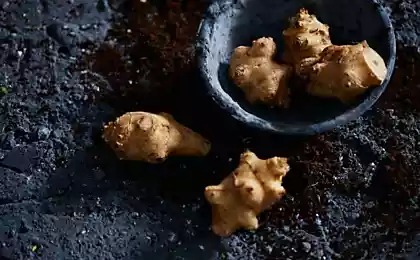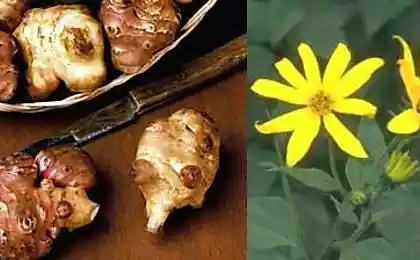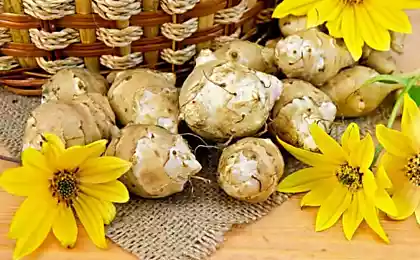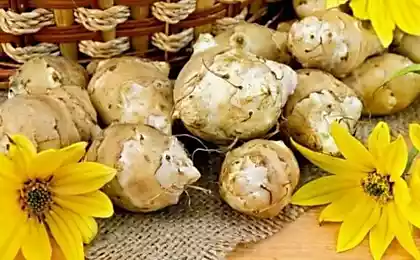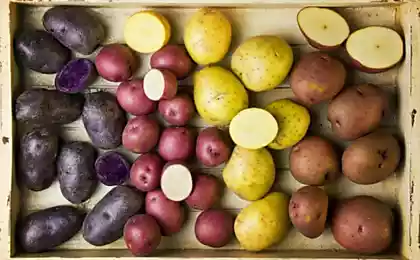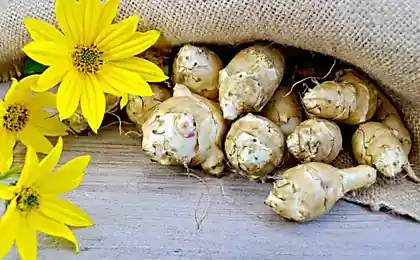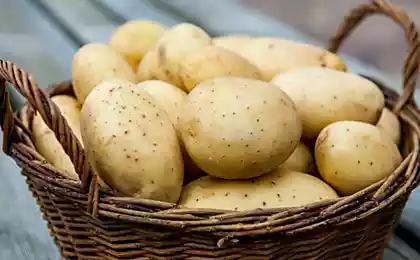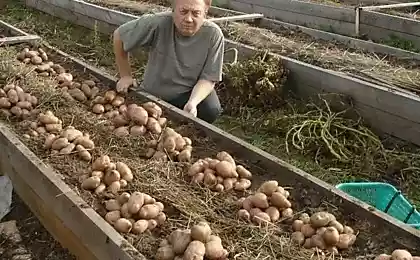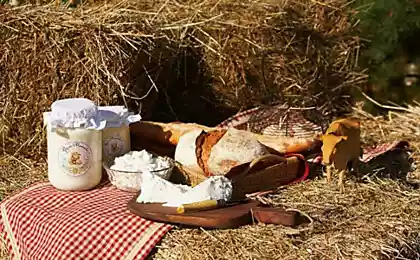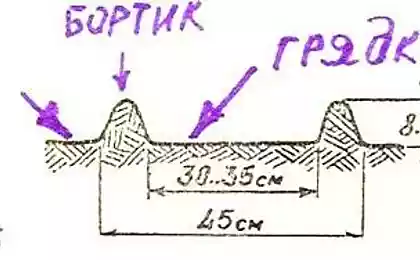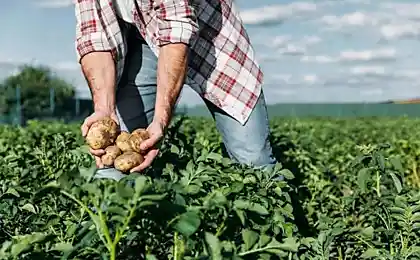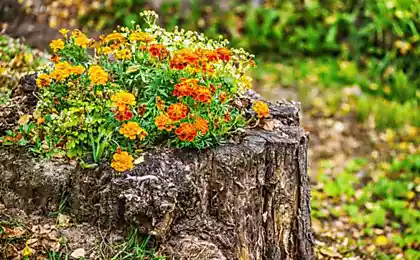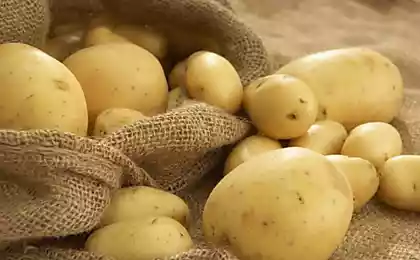580
Will start to grow a Jerusalem artichoke and You will forever refuse potatoes

Many have heard of such a plant as the Jerusalem Artichoke. But few people know what wonderful opportunities there are this plant. If you start to grow, you will forever refuse of potatoes, but only if you are not an avid fan.
Now people are trying to minimize their efforts on cultivation of potatoes, the soil is not plowed, not hilling mulch that does not require irrigation, many do not collect the Colorado potato beetle. But still some effort must be made that it would grow. What you need to do at least:
1. The potatoes need to be planted
2. It is necessary to dig
3. In winter it must be stored somewhere
4. Mulch
And if you take the traditional method of growing potatoes – it's a huge effort that is unless You take, the crops do not get.
And what efforts need to be made, that would be from year to year to harvest Jerusalem artichoke? So, here they are:
1. No !!!!

On the contrary, if you plant it once, you will need to make big effort to get rid of it. Of course, there is one action that needs to be done in the beginning – it should be a time to plant and then he would have to grow from year to year. If you are lazy, you can't even dig up, it is perfectly stored in the soil in winter, so it does not need to build any storage. In this sense, the Jerusalem artichoke is similar to a strong weed and even if you have it all dug up, then it is even better – you will vzryhlite the rug.
The taste of the tubers of Jerusalem artichoke slightly sweet, so it can be eaten even raw, unlike potatoes. And how many wonderful dishes can be made from it – you can verify this by typing in a search engine. In addition, the Jerusalem artichoke can be used for medicinal purposes!!! And this despite the fact that this is a very beautiful flowering plant.
Now, many are learning how to harvest and when not to water, not to weed etc and who tries, in practice, rarely anyone from the first time something happens, my advice is to start with a Jerusalem artichoke and you will not go wrong.
When you have the opportunity to see it in practice, you begin to come to mind of such thoughts: "And why then you need potatoes?"
https://vk.com/video_ext.php?oid=10073520&id=164329997&hash=0223ea54e0602e36&hd=2
Jerusalem artichoke — common in the Russian plant, which is the usual summer residents generally perceived as a pernicious weed. This beautiful yellow flowers, which, as it turns out, is almost impossible to withdraw, and fight with thickets of people have over the years.
In addition to the flowers of the Jerusalem artichoke is known for its tubers, which are popularly called earthen pear. Cluble small — average size potatoes, in structure and taste — sweet, juicy potatoes with a hint of nuts and aroma of sunflower seeds (one of the species of sunflower). It is a valuable vegetable you can eat raw, cook, make him a syrup and much more. For us it is the perfect culture: the delicious, edible, hardy, grows itself.
Artichoke — plant, like the bees (one of the late honey plants), tubers like rodents — they eat it instead of other, more valuable crops, it creates wind. We are actively propagated on the site. For example, planted on the sides of the ranks of our lesopolye.
After several hours of drying receive the flowers you can store as much as necessary to brew in the winter and enjoy the bright summer scent.
Another academician Kliment Arkadyevich Timiryazev pointed to the Jerusalem artichoke as "one of the most intense of field crops" and noted that the use of solar energy on the formation of organic matter (in parts) is he 1/180, while at rye, oats (grain, straw and root residues) — 1/80.
One hectare of the Jerusalem artichoke are able to absorb from the air during the year 6 tons of carbon dioxide, and 1 ha of forest — 3 — 4, If 1 ha of forest can provide the concentration of oxygen sufficient for breathing 30 people, the Jerusalem artichoke is 1.5 — 2 times more. In this regard, and given the resistance to acid rain, is considered appropriate to include the Jerusalem artichoke in the green spaces around industrial cities with strong fumes in the air.
https://vk.com/video_ext.php?oid=10073520&id=164330008&hash=ad872881d6fa5895&hd=1
Plants tolerate (stand) the high content of oxides of sulphur, nitrogen, hydrogen sulfide, ammonia and other gases, and good clean air from them.
After the disaster occurred at Chernobyl, scientists have made measurements to determine the presence of radiation in crops grown in close proximity to the ill-fated place. It would seem the results were obvious, but one fact was the cause of their genuine surprise: the artichoke was perfectly edible. Surprisingly, he remains "pure" with respect to other pollutants present in the soil in our days. Add to this its simplicity, is inversely proportional to its benefits and You will understand how valuable it is culture.
Jerusalem artichoke has many names: "artichoke", "Jerusalem artichoke", "sun root." Another name for the Jerusalem artichoke — a tuber of the sunflower, because these plants of the same genus. All of these names, the plant received centuries of use. Ancestors appreciated for its taste and medicinal properties, but we underestimate. Apparently the fact that too little is known.
The tubers of Jerusalem artichoke have a very intricate shape fusiform, pear-shaped, round, oval etc. Inflorescence Jerusalem artichoke is a sunflower seed in a miniature basket. The appearance is not devoid of decorative qualities.

Flowers of Jerusalem artichoke
Homeland plants – America, where it grows wild. In the sixteenth century, the artichoke was introduced into England, and later she went to France, where he received his traditional name "Jerusalem artichoke" (from the name of a tribe of Indians tupinamba). In Russia the sun's root was in the nineteenth century. Fell in love, and cookbooks began to be filled with many recipes from unusual tubers.
Healthy properties of Jerusalem artichoke
The mere fact that the Jerusalem artichoke is not susceptible to various pollutants and remains what is called an environmentally friendly product that already makes it extremely useful. But this property he is able to convey to us. Regular consumption of artichoke promotes deep cleanse the body, ridding it of toxins, heavy metals and other nasty things that inevitably accumulated in the city. The Jerusalem artichoke contains pectin, which is a good absorbent and cause the same wonderful ability to clean the body. By the way, thanks to him also from Jerusalem artichoke can get the syrup and cook wonderful jam (by the way, diet, but more on that below). Here's toli toli root fruit!
Bringing the body of "toxins" the root adds to its other more useful and necessary substances mineral salts (potassium, silicon, zinc, iron), pectin, amino acids, proteins and lots of vitamins ( B1, B2, B6, C, PP). The polysaccharide content makes it a quite energy-intensive. Depending on the time of collecting the sugar content in the tubers may be different. The minimum rate of the substance noted in early October (eight percent), the maximum – in the beginning of December (twenty percent). Sugar accumulates in the tubers due to the outflow from the leaves and stems of nutrients.
There is evidence of the fact that regular consumption of this root vegetable for a long time, reduces the concentration of sugar in the blood. This is due to another wonderful element that is present in the Jerusalem artichoke — inulin. Inulin — a polysaccharide, a source of energy, but its peculiarity is that the processing of his body not associated with an increased release of glucose, as in the case of the carbohydrates contained, for example, other roots, so there is no risk of occurrence of diabetes. There is good news for diabetics. During storage of Jerusalem artichoke inulin is converted into fructose, and the root fits into their diet. Remember the delicious jam from Jerusalem artichoke? Eat it, drink compote of Jerusalem artichoke and all this without the typical consequences.
Studies followed by experiments have shown a significant positive effect of artichoke on the digestive system. With food and in the process of digestion, the intestine gets a huge amount of ballast compounds that bind to and neytralizuya. Parallel to the improved condition of the gastrointestinal tract, stimulates the choleretic activity.
The use of artichoke helps to strengthen the immune system, increase resistance to various viruses and infections that affects the digestive system. The nutrients of this vegetable do not allow penetration into the body of various parasites and bacteria, for example, opistorhisov. In addition, artichoke contributes to the formation of the normal intestinal flora, creating all the necessary conditions for this. This is why this product is indispensable for people suffering from dysbiosis. Artichoke improves blood flow to mucous membranes, it is used in the treatment of stomach ulcers, duodenitis, enteritis, gastritis, pancreatitis, to eliminate heartburn, constipation and diarrhea.
Also, this fruit can be used to stop vomiting, relieve nausea, to get rid of bitter taste in the mouth, eliminate bloating and pain. When co-administered Jerusalem artichoke and various medications, the treatment period is shortened by five to seven days.
Root also promotes the absorption of selenium, despite the fact that it includes no present, this trace element.
There is a benefit and in the ground part of Jerusalem artichoke. It is generally used for feeding cattle, but from the stalks by pressing it is possible to obtain the sweet juice, suitable for making molasses. For feed varieties of plants characterized by a small number of tubers and the presence of dense green mass. If you feed cows a Jerusalem artichoke, they significantly added the milk yield and fat content of milk this increases. When feeding the vegetable hens, increased egg production, the period of beginning of egg laying is reduced by two to three weeks. Also Jerusalem artichoke feed goats, pigs, sheep and rabbits. Especially this valuable early spring forage because it contains significant amounts of vitamins and nutrients.
Growing
Artichoke is mainly propagated by means of tubers. In the middle zone of Russia, and also in the North, its seeds do not ripen. In one place this plant can grow more than forty years! In autumn, the ground part of Jerusalem artichoke dies, the remaining spring germinate in the soil the tubers, and the plant again repeats its cycle of development and growth. Its roots deep into the soil, which contributes to high drought resistance. Tubers usually are substituted close to the surface, their weight rarely exceeds one hundred twenty grams.
Grown artichoke as well as potatoes. Since the advent of the green shoots it, Spud ground that the beneficial effect on the crop. You can plant Jerusalem artichokes in winter or early spring. In the winter, it is necessary to put only whole tubers, cut can bend. The spring planting is allowed cutting of tubers, it is important not to damage the eyes kidney growth. The plant prefers a Sunny position.
Jerusalem artichoke has an interesting feature: it can be harvested in autumn and spring. The tubers are not dug up, perfectly preserved under the snow. They can survive the thaw, and freeze again when you chill, and their vitality and nutritional value does not suffer. More! Has been said that
If you need to plant other crops on the place where he grew Jerusalem artichokes, thoroughly collect all remaining in the land of the tubers.
How to store Jerusalem artichokes?
In the basement earthen pear should be stored at a temperature of zero degrees Celsius. Root crops are perishable and dry in an ordinary home, making them unfit for consumption.
Preferably the spring digging tubers than the autumn. As soon as the snow melts and the ground thaws, we can start to choose earthy pear. At a time when fruits and vegetables have almost no vitamins in it, they are saved in full.published
P. S. And remember, only by changing their consumption — together we change the world! ©
Source: www.pervorod.ru/blogs/eto-interesno/topinambur

